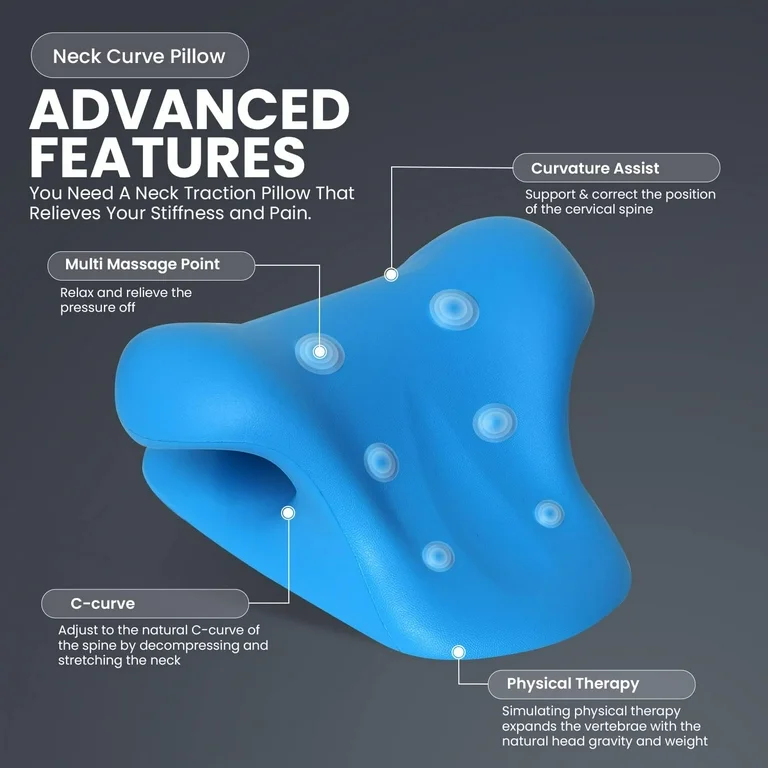Neck Cloud: Ingenious Support for Discomfort Alleviation and Better Stance
Neck Cloud: Ingenious Support for Discomfort Alleviation and Better Stance
Blog Article
The Influence of Stress on Neck Discomfort: Strategies for Lowering Stress and Pain
In today's fast-paced world, it's no key that tension has become a prevalent element in the beginning and worsening of neck pain. Join us on a trip to decipher the effect of stress on neck pain and uncover reliable ways to reduce discomfort and improve general quality of life.
Recognizing Stress-Related Neck Discomfort
Neck pain is an usual issue that can frequently be credited to stress. Stress-related neck discomfort can show up as stress, tightness, or pain in the neck and shoulder area. The connection between anxiety and neck discomfort depends on the body's physiological reaction to stress, which can lead to muscle mass tension and rigidity in the neck muscle mass. Persistent anxiety can result in consistent neck discomfort and aggravate current conditions like cervical spondylosis or muscular tissue pressures.

Identifying Common Tension Locations
Often experienced by people under tension, tension areas in the body can provide beneficial insights into the physical manifestations of psychological strain. One usual stress area is the neck, where stress frequently manifests literally. Stress frustrations, stiff neck muscular tissues, and restricted variety of motion are typical symptoms of stress-related neck tension. The shoulders are an additional common location where stress builds up. Anxiety can cause the muscle mass in the shoulders to tighten, bring about discomfort and discomfort. In addition, the top back is susceptible to tension accumulation, specifically in individuals who experience chronic tension. Poor posture and extended sitting can intensify tension in this location. The jaw is also a typical area for stress-related stress, as many individuals squeeze their jaw or grind their teeth when worried. Recognizing these usual tension locations can help people recognize the physical signs of stress and anxiety and take steps to address them prior to they escalate into persistent discomfort or discomfort.
Executing Leisure Methods
To successfully take care of stress-related tension in the body, carrying out relaxation strategies is critical. Leisure techniques are beneficial tools for lowering neck pain triggered by stress and anxiety. Deep breathing workouts can help soothe the mind and unwind stressful muscular tissues in the neck and shoulders (neck cloud). Exercising mindfulness meditation can also be valuable in relieving stress and anxiety and advertising leisure. Modern muscle mass relaxation, where you systematically strained and after that kick back various muscle teams, can release built-up stress in the neck area. Furthermore, tasks like yoga and tai chi integrate both physical activity and leisure, making them reliable practices for minimizing stress and anxiety and neck discomfort. Taking regular breaks throughout the day to stretch and loosen up can Full Article prevent muscle mass stiffness and tension from building up. By including these leisure techniques into your daily regimen, you can help manage stress levels, minimize stress in the neck, and ease discomfort connected with stress-induced neck pain.
Including Self-Care Practices
Incorporating self-care methods is important for preserving total well-being and managing stress-related neck discomfort efficiently. Participating in normal physical activity, such as mild extending workouts or yoga, can aid alleviate stress in the neck and shoulders. Exercising excellent position throughout the day and taking regular breaks from extended resting or display time can additionally prevent stress on the neck muscle mass.
Furthermore, prioritizing appropriate sleep and developing a regular rest regimen can add substantially to reducing anxiety levels and promoting relaxation. Developing a calming going to bed routine, such as reviewing a book or taking a cozy bathroom, can aid prepare the body and mind for restful rest. Furthermore, preserving a well balanced diet view it now plan abundant in nutrients and remaining hydrated can sustain overall health and decrease swelling that might worsen neck pain.
Incorporating mindfulness techniques, such as deep breathing workouts or reflection, can help take care of stress and anxiety and promote relaxation. Taking some time for oneself, involving in pastimes, and setting limits to shield individual time are additionally vital facets of self-care that can add to lowering tension and alleviating neck pain.
Looking For Specialist Help
Exactly how can people effectively attend to relentless neck pain that is influencing their everyday life and well-being? Looking for professional aid can be an important step in managing and minimizing neck discomfort.
Chiropractic specialists specialize in spinal control strategies to improve placement and lower stress in the neck area. Physical therapists supply targeted workouts and stretches to strengthen muscular tissues, boost adaptability, and boost overall neck feature. Orthopedic professionals can supply sophisticated clinical treatments such as shots or surgical alternatives for extreme cases of neck pain.
Verdict

Stress-related neck discomfort can show up as tension, tightness, or discomfort in the neck and shoulder area. The connection between stress and anxiety and neck discomfort exists in the body's physical action to stress, which can result in muscle mass tension and rigidity in the pop over to these guys neck muscular tissues. Stress headaches, stiff neck muscles, and restricted range of activity are common symptoms of stress-related neck tension. By including these relaxation strategies right into your day-to-day regimen, you can aid handle stress degrees, reduce tension in the neck, and ease discomfort associated with stress-induced neck pain.

Report this page